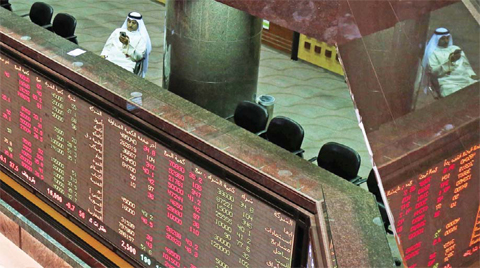Kuwait stocks edge lower, Egypt shares rise
 KUWAIT: A trader follows the stock market at the Kuwait Stock Exchange (KSE) in Kuwait City. Kuwait stocks ended yesterday’s trading on a mixed board. The benchmark dropped by 2.07 points to settle 6,801 points, while Weighted and KSX 15 indices went up by 0.68 and 2.56 points respectively. — Photo by Yasser Al-Zayyat
KUWAIT: A trader follows the stock market at the Kuwait Stock Exchange (KSE) in Kuwait City. Kuwait stocks ended yesterday’s trading on a mixed board. The benchmark dropped by 2.07 points to settle 6,801 points, while Weighted and KSX 15 indices went up by 0.68 and 2.56 points respectively. — Photo by Yasser Al-ZayyatDUBAI: Most Gulf stock markets fell yesterday as the diplomatic crisis surrounding Qatar worried investors, while Egypt's equities index climbed for an 11th straight day to a fresh record high.
Qatar's index fell 1.6 percent to 9,059 points, its lowest close since January 2016, in heavy trade. It had plunged 7.3 percent on Monday after Saudi Arabia, the United Arab Emirates and Bahrain cut diplomatic and transport ties with Qatar.
The Qatari market rebounded more than 3 percent in early trade yesterday, buoyed by hopes that a Kuwaiti mediation effort might succeed. Some fund managers also said they expected Qatari state-linked funds to support the market. But the rebound was short-lived. In contrast to Monday, when selling of stocks was indiscriminate, many of the biggest losers yesterday were related to Qatar's foreign trade, which could decline or face higher costs due to the sanctions.
Logistics company Gulf Warehousing sank 8.0 percent and Qatari German Medical Devices, which has done considerable business in Saudi Arabia, tumbled 8.8 percent.
The biggest lender, Qatar National Bank, slipped 1.3 percent. Although Qatar's huge financial reserves mean it can probably avoid a crippling crisis, many parts of its economy, from tourism to banks which obtain funding from elsewhere in the Gulf, may be hit.
Most other Gulf bourses dropped moderately. Although Gulf economies have little exposure to Qatar, foreign portfolio investors may at least temporarily become more cautious towards the whole region; the Saudi riyal edged down in the one-year forwards market yesterday and regional bonds slipped.
The Saudi Arabian, UAE and Bahraini central banks have not yet clarified how they want commercial banks in their countries to handle business ties with Qatar, which involve substantial cross-border lending, deposits and syndicated loans.
If the commercial banks are advised to get rid of their Qatari assets in a short timeframe, or if authorities act against Qatari banking assets in their jurisdictions, that could provoke retaliation by Doha and turmoil in the Gulf banking and money markets.
The Saudi stock index, which has been buoyed in recent days by expectations that international index compiler MSCI will start on June 20 a process towards upgrading Riyadh to emerging market status, fell 0.5 percent in active trade yesterday.
Petrochemical stocks were particularly hard hit after oil prices dropped on concern that the Qatar crisis could disrupt an agreement among global oil producers to prop up prices. Saudi Basic Industries lost 1.4 percent. Dubai's index edged up 0.2 percent as builder Drake & Scull, which has been rebounding from year-lows for the past week, added 1.1 percent to 0.38 dirham in its heaviest trade for almost four months. But it came well off the day's high of 0.409 dirham.
In Egypt, the index rose 0.8 percent on the back of strong blue-chip property developers, although in the broad market, gainers roughly equalled losers.
Remco Tourism Villages jumped 9.9 percent after saying it intended to finish marketing all units of its Stella Heights project before year-end for about 2.5 billion Egyptian pounds ($139 million).
SAUDI ARABIA
* The index fell 0.5 percent to 6,933 points.
DUBAI
* The index edged up 0.2 percent to 3,322 points.
ABU DHABI
* The index fell 0.5 percent to 4,460 points.
QATAR
* The index dropped 1.6 percent to 9,059 points.
EGYPT
* The index rose 0.8 percent to 13,627 points.
KUWAIT
* The index edged down 0.03 percent to 6,801 points.
BAHRAIN
* The index edged down 0.1 percent to 1,325 points.
OMAN
* The index edged up 0.02 percent to 5,407 points. -- Reuters










